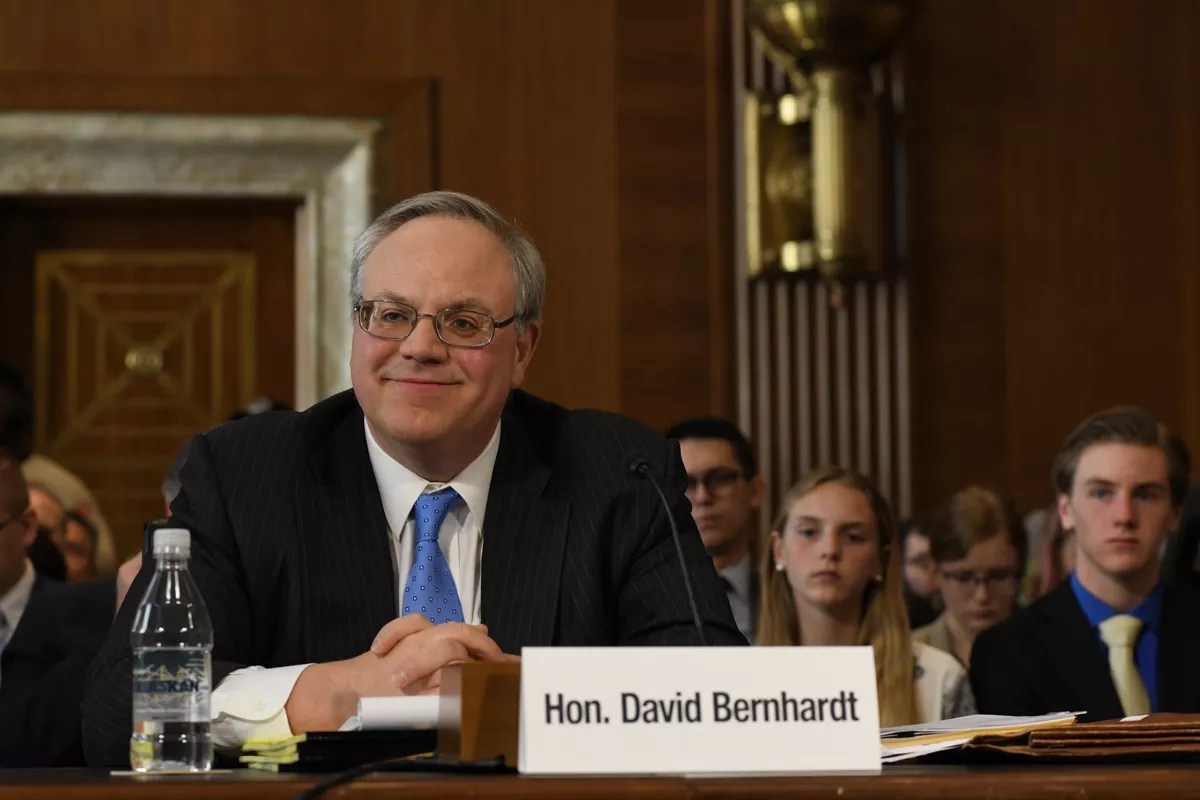
Courtesy of the U.S. Department of the interior

Audio By Carbonatix
The Bureau of Land Management is full of landmines these days. Amid a push to return BLM headquarters to Washington, D.C., from Grand Junction, President Joe Biden’s nominee for BLM director, Tracy Stone-Manning, was grilled by Republican senators during a June 8 hearing before the Senate Committee on Energy and Natural Resources.
A division of the Department of the Interior, the BLM handles everything from oil and gas drilling to wild horse herds. Under David Bernhardt, President Donald Trump’s Interior Secretary, last August the BLM office was moved to Grand Junction – not far from Bernhardt’s hometown of Rifle.
Colorado politicians as diverse as U.S. representatives Lauren Boebert, Ken Buck, Doug Lamborn, Joe Neguse and Ed Perlmutter have all advocated keeping the BLM headquarters in Grand Junction, as have U.S. senators John Hickenlooper and Michael Bennet, as well as Governor Jared Polis. But critics argue that the BLM, which lost many employees during the transition, belongs back in D.C.
During the Stone-Manning confirmation hearing, committee member Hickenlooper noted that when the headquarters switched, 287 BLM employees chose to retire or find different unemployment, while just 41 moved west. Only a few of those actually ended up in Grand Junction. “I wanted to make sure that as you consider the future of the headquarters of the BLM, you recognize that those 41 people in Grand Junction are in the balance in some way,” Hickenlooper told the nominee.
Stone-Manning acknowledged that she would consider the Grand Junction employees. A Montana resident, she had previously criticized the BLM’s move to Colorado.
Despite recent accounts of an empty BLM office in western Colorado with a skeleton crew, Bernhardt sees no problem with keeping the office in Grand Junction.
“Having the leadership of the bureau out closer to the West made a tremendous amount of sense,” Bernhardt says. “And I think that folks that have criticized the effort really haven’t analyzed carefully the roles of the folks doing their jobs, and their ability to do them in the West.”
Living in the West, where issues from “archaeology to wild horses” seem more immediate, is a reason to keep the BLM in Grand Junction, he says. “And the reality is, I think, particularly with COVID, it’s becoming increasingly clear that certainly work can be conducted between D.C. and in other areas relatively easily. And to be candid, when the deputy director of BLM was in his Grand Junction office, I talked to him just as much as I did when he was located in the main Interior building. And so I don’t think it has a negative impact on communication efforts. It certainly doesn’t have any impact on the ability of the agency to be involved in D.C. issues.”
During his time in D.C., Bernhardt faced a barrage of complaints about his involvement in a variety of issues, since he’d previously lobbied for companies that sought to expand their rights on public lands, including oil and gas and mining interests. Bernhardt began working at the Department of the Interior in 2001 and returned to the private sector in 2009; he served as deputy secretary at Interior from 2017 until 2019 and was confirmed as Secretary of the Interior in April 2019, when environmentalists dubbed him “Swamp Monster.”
Bernhardt is now back in Colorado at the law (and lobbying) firm of Brownstein Hyatt Farber Schreck LLP as senior counsel. Deb Haaland, the former representative from New Mexico who is the first Native American appointed to the cabinet, replaced Bernhardt as the head of Interior.
“I would suspect that even as the administration makes its decisions, whatever they are, they will find that the vast majority of folks in positions that have been reallocated will end up remaining there, whether the leadership wants to acknowledge that the headquarters should be there or not,” Bernhardt concludes.
If confirmed, Stone-Manning would take on a position last held by another controversial Coloradan, William Perry Pendley, who was president of the Lakewood-based Mountain States Legal Foundation – a group that often fights against federal agencies to push for private rights to public lands. Pendley was always interim BLM director and never approved by the Senate. He left the job last September, after a judge determined that because he’d never been confirmed, Pendley had been acting as interim director of the BLM unlawfully.